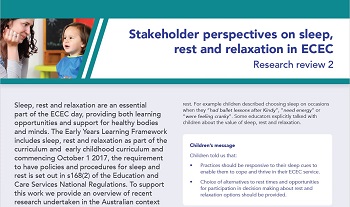Inequalities and social mobility
Policy brief: Stakeholder perspectives on sleep, rest and relaxation in ECEC
 Sleep, rest and relaxation are an essential part of the ECEC day, providing both learning opportunities and support for healthy bodies and minds. The Early Years Learning Framework includes sleep, rest and relaxation as part of the curriculum and early childhood curriculum and commencing October 1 2017, the requirement to have policies and procedures for sleep and rest is set out in s168(2) of the Education and Care Services National Regulations. To support this work we provide an overview of recent research undertaken in the Australian context documenting the perspectives of children, parents and educators.
Sleep, rest and relaxation are an essential part of the ECEC day, providing both learning opportunities and support for healthy bodies and minds. The Early Years Learning Framework includes sleep, rest and relaxation as part of the curriculum and early childhood curriculum and commencing October 1 2017, the requirement to have policies and procedures for sleep and rest is set out in s168(2) of the Education and Care Services National Regulations. To support this work we provide an overview of recent research undertaken in the Australian context documenting the perspectives of children, parents and educators.
Policy brief: Widening participation through secondary school mechanisms
University attendance is one of the strongest predictors of labour market success, personal health and wellbeing, and positive social outcomes. However, people from low socioeconomic backgrounds are disproportionately excluded from the benefits of tertiary education.
Since the release of the A Fair Chance for All report in 1990, Australian Higher Education policy has focused on increasing the number of students from disadvantaged backgrounds attending university. Yet, despite more than 25 years of policies aimed at reducing the gap, there is still a significant difference between the numbers of students from advantaged and disadvantaged backgrounds enrolling in university.
This brief provides a summary of our research findings, which highlight the key role of teachers and schools in supporting students from low socioeconomic backgrounds to enrol in university. Good teachers and supportive school environments have the capacity to compensate for some deficits felt more strongly by students from low socioeconomic backgrounds (such as a lack of Higher Education aspirations, information about university and role models).
Welfare dependency or inherited disadvantage?
Are hard work and individual effort enough to help a person break free from a life of disadvantage, or are there systemic inequalities that prevent some people from becoming the masters of their own destiny?
ISSR's Director, Professor Mark Western, and the Life Course Centre's Director, Professor Janeen Baxter, discussed these questions with a public audience at The University of Queensland’s Global Leadership Series public lecture on Wednesday 16 November 2016, where they provided insights into tried and tested interventions that have been making inroads to even out the playing field.
ISSR Director joins Lateline panel discussion on the Priority Investment Approach to Welfare
Should Australians lose their welfare benefits if they don’t comply with the government’s new welfare rules?
That was the question put to an expert panel including ISSR Director, Professor Mark Western, on Lateline on Friday 23 September 2016.
Professor Western joined host David Lipson, Sally Sinclair, CEO of the National Employment Services Association and Dr Cassandra Goldie, CEO of the Australian Council of Social Service to discuss the government’s recently announced Priority Investment Approach to Welfare.
Welfare dependency or inherited disadvantage?
Are hard work and individual effort enough to help a person break free from a life of disadvantage, or are there systemic inequalities that prevent some people from becoming the masters of their own destiny?
ISSR's Director, Professor Mark Western, and the Life Course Centre's Director, Professor Janeen Baxter, discussed these questions with a public audience at The University of Queensland’s Global Leadership Series public lecture on Wednesday 16 November, where they provided insights into tried and tested interventions that have been making inroads to even out the playing field.
